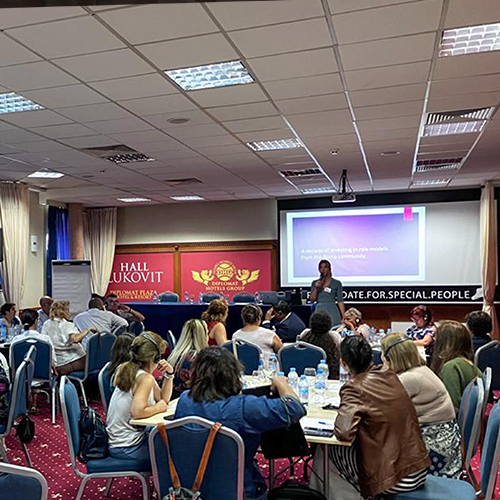The Young Roma Teachers program, developed by Bulgarian organization Trust for Social Achievement (TSA), employs Roma student-teachers in local kindergartens in the country to provide professional development opportunities for youths. In addition to advocating for Roma representation and creating positive role models for young children, the program creates employment opportunities for young Roma professionals and contributes to easing a shortage of pedagogical practitioners in kindergartens. So far, six Roma youths have participated and will begin working in kindergartens by the beginning of 2024.
The Early Childhood Workforce Initiative (ECWI) advocates for a well-prepared, qualified, and diverse early childhood workforce. Recently, TSA hosted a two-day study visit with support from the International Step by Step Association (ISSA) as part of ISSA’s Peer Learning Activities (PLAs). The visit took place in Lukovit, Bulgaria and provided an opportunity for ISSA member organizations to explore new initiatives, enrich, and inspire new practices.
Reflecting on her experience during the PLA, Bojana Gotlin, Director of ISSA Member Open Academy Step by Step noted that,
"The study visit held by TSA was especially useful to us at this point when our organization is initiating a new project on supporting Roma professionalization in early childhood education and care. Learning from our Bulgarian colleagues how to best encourage, support and empower future professionals within Roma communities through a program of Roma role models was very useful for us as it is one of the very few existing examples of successful recruitment, support and career development for future Roma professionals. Both Roma and other children living in shared communities will benefit immensely from having motivated and trained professionals of Roma heritage providing not only quality child-care and education but also multiculturalism and diversity."
This program serves as a positive example of the creation of career pathways for Roma youth. Such programs can provide other countries with models to develop a well-prepared, qualified, and diverse early childhood workforce.
Increasing the number of under-represented professionals, such as Roma teachers, in the early childhood workforce is important for the quality of services. When children see adults from various backgrounds working together, it provides them with positive role models and helps them learn respect and appreciation for diversity.
Learn more about the PLA’s key takeaways and TSA’s initiatives surrounding Roma role models here.
Did you find this interesting? Sign-up for our newsletter to receive updates about new resources and join the conversation about the early childhood workforce on X (formerly Twitter).

